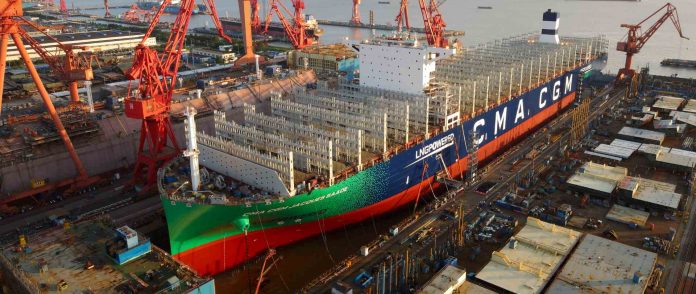The container ship orderbook marches towards record highs constantly, as liner operators and tonnage providers keep targeting a reduced carbon footprint with vessels powered by alternative fuels, even as cargo demand heads south.
Alphaliner’s report said that in the first nine months of 2023 alone, 187 boxships were commissioned, mostly ordered by liner operators, and adding 1.75 million TEU of capacity.
These newbuilding orders have taken the orderbook to an all-time peak of 7.88 million TEU, translating to 29% of the in-service fleet.
Alphaliner explained, “There are two obvious reasons why ordering continues at such as massive scale: Firstly, most carriers are still sitting on large amounts of cash after having made record profits in the wake of the Covid-19 pandemic. Secondly, and more importantly, it is the desire to decarbonise liner shipping that drives the ordering frenzy.”
Methanol-powered ships represented 52% of all new capacity ordered this year, while LNG-powered newbuildings comprised 31% of the 2023 orders, bringing the total share of ‘green’ ships to 83%.
French carrier CMA CGM has been the most active in ordering newbuildings, going for both LNG-propulsion (for another ten 24,000 TEU ships) and methanol dual-fuel (for six 15,000 TEU, twelve 13,000 TEU and eight 9,200 TEU newbuildings) costing US$6.5 billion.
Taiwan’s Evergreen Marine Corporation selected methanol as an alternative fuel for another 24 ships of 16,000 TEU, costing over US$4.62 billion.
MSC will increase its LNG-powered fleet by another 20 ships of 10,300 and 11,400 TEU, which it ordered at Zhoushan Changhong International Shipyard.
Maersk Line, whose recently delivered 2,136 TEU Laura Maersk is the only methanol-powered container ship currently in service, has this year increased its orderbook for methanol dual-fuelled vessels to 24 units by ordering six 9,000 TEU ships at Yangzijiang Shipbuilding. Maersk’s orderbook is expected to grow further as the Danish carrier is reported to be in the process of selecting a shipyard for the construction of up to 15 methanol-powered ships of 3,500 TEU.
The procurement and availability of alternative fuels present another challenge in decarbonisation.
Belgian owner Delphis, which took delivery of the 6,014 TEU CMA CGM Masai Mara, which is the first ‘ammonia-ready’ ship in the container fleet, is developing ammonia-compatible engines through its subsidiary CMB.TECH, and plans to have these ready by 2026. Retrofits of ‘ammonia-ready ships’ are then scheduled to kick off in that same year.
The remaining ‘non-green’ ships ordered this year could turn ‘green’ in the future. These include three ‘methanol-ready’ 16,000 TEU ships for COSCO Shipping Lines, ordered at the group’s own Yangzhou shipyard, and ten ‘methanol and ammonia-ready’ 13,700 TEU vessels that ONE ordered from Imabari Shipbuilding.
Martina Li
Asia Correspondent







